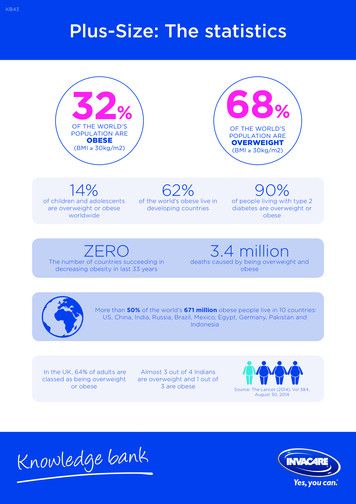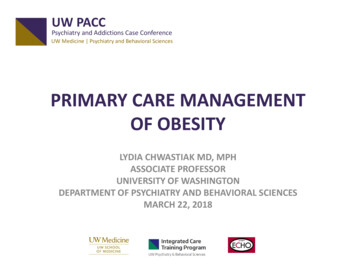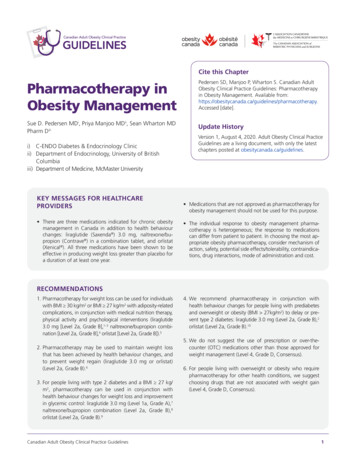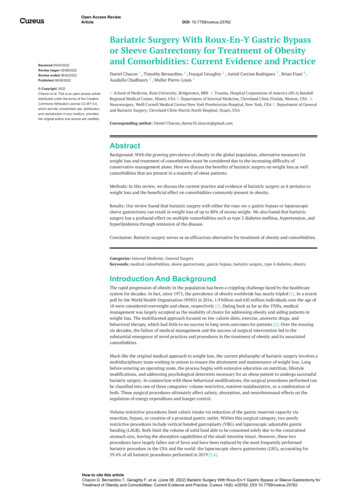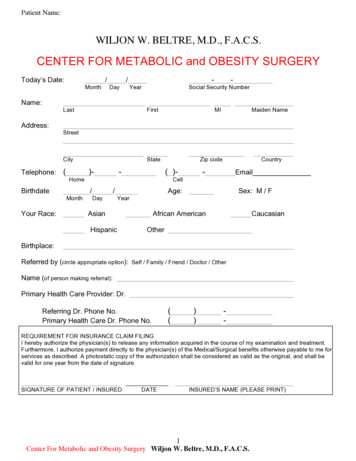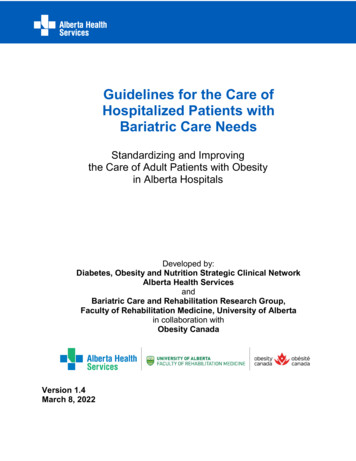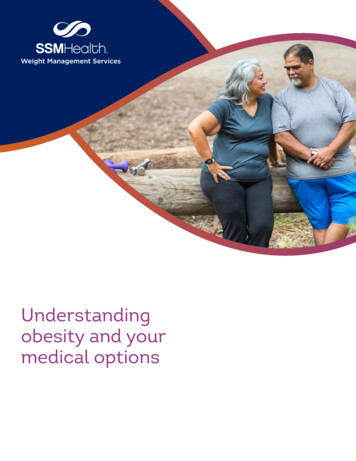
Transcription
Understandingobesity and yourmedical options
Understandingobesity andyour medicaloptionsWelcome to SSM Health Weight Management ServicesThank you for your interest in our weight-loss program and for choosing us to assist you in your journey. This guide hasbeen created to introduce you to SSM Health Weight Management Services.We treat the chronic disease of obesity throughrespectful and personalized care. We treat obesity seriously, like otherchronic diseases, based on current researchand evidence. We focus on improving our patients’overall health and well-being. We focus on long-term weight management,not just weight loss. We provide personalized, long-term,sustainable treatment. We do not recommend treatments withhigh failure rates. We do not propagate myths. We respect patient autonomy.Our comprehensive weight-loss surgery program hasthe ultimate goal of helping people live better quality,healthier, and longer lives. We address all your weightmanagement needs. This might include bariatric surgery.We will help you with every step leading up to andfollowing surgery, including dietary modificationand support.Growing a healthier communityExercise and eating right are the best ways to loseweight. But many people have tried those methods foryears and still can’t lose excess weight — weight thatcan cause serious health problems. For people in thisfrustrating situation, medically supervised weight lossor bariatric surgery may be an option.SSM Health Weight Management Services works withpatients to provide a holistic approach in the treatmentand management throughout our program. We will assistyou in making the necessary behavioral changes and inthe management of any physical and/or emotional issuesassociated with your weight. The decision to undergoweight-loss surgery is not one that should be entered intolightly. One must carefully consider the potential risksinvolved and the anticipated benefits. These potentialrisks will be reviewed with each individual patient basedupon their needs by your surgeon and the WeightManagement Services team.Thank you for allowing us the opportunity toaccompany you on a new journey — one that willbe successful in conquering your long-time battlewith obesity.SSM Health 2
Understanding obesity andyour medical optionsWhat is obesity?Obesity is a disease of excess body fat accumulation that impairs health and well-being. It is NOT a simple, self-inflicted,cosmetic problem. It is a serious, complex, chronic disease.Who needs treatment? If your weight is adversely affecting your health andwell-being, you could benefit from treatment. Surgical treatment for obesity is an option for wellinformed patients who have clinically severe obesity(BMI 40 or a BMI 35 and other serious healthconditions) and are willing and able to adhere to thelifestyle changes required to maintain a healthy bodyweight after surgery.What causes obesity?The reasons for obesity are multiple and complex.Despite conventional wisdom, it is not simply a resultof overeating. Research has shown that in many cases asignificant, underlying cause of morbid obesity is genetic.Studies have demonstrated that once the problem isestablished, efforts such as dieting and exercise programshave a limited ability to provide effective long-termrelief. Science continues to search for answers. But untilthe disease is better understood, the control of excessweight is something patients must work at for their entirelives. That is why it is very important to understand thatall current medical interventions, including weight-losssurgery, should not be considered medical cures. Ratherthey are attempts to reduce the effects of excessiveweight and alleviate the serious physical, emotional,and social consequences of the disease.SSM Health 3
Understanding obesity andyour medical optionsWe probably have a number of genes directly related to weight. Just as some genes determine eye color or height,others affect our appetite, our ability to feel full or satisfied, our metabolism, our fat-storing ability, and even our naturalactivity levels.Genetic factors that may play a partNumerous scientific studies have established that yourgenes play an important role in your tendency to gainexcess weight. The body weight of adopted children shows nocorrelation with the body weight of their adoptiveparents, who feed them and teach them how to eat. Their weight does have an 80% correlation with theirgenetic parents, whom they have never met. I dentical twins, with the same genes, show a muchhigher similarity of body weights than do fraternaltwins, who have different genes.Environmental factorsEnvironmental and genetic factors are also closelyintertwined. If you have a genetic predispositiontoward obesity, then the modern American lifestyle andenvironment may make controlling weight more difficult.Having a fast food diet or one that is composed ofprocessed foods versus natural foods, along with havinga job where you are not very active (such as sitting at adesk) will contribute to weight gain especially if you donot have a regular exercise routine. Also, where you live,such as in a suburban neighborhood that requires you touse a car to go to work or shop, all magnify hereditaryfactors such as metabolism and efficient fat storage.Find available weight management options in your area atssmhealth.com/weight-management.SSM Health 4
Understanding obesity andyour medical optionsHow is obesity treated?As with most other chronic diseases — like diabetes, heart disease, high blood pressure, sleep apnea — there is no curefor obesity. Individualized, lifelong treatment is necessary. Your options include medically supervised diet and exerciseprograms, medications, and bariatric surgery.A healthy daily routine is the foundationof obesity treatment.Medications and metabolic/bariatric surgery can beadded as disease severity increases. Medications can decrease the urge to eat, allowsatisfaction with less food, and decrease cravings.Not everyone responds to these medications.Unfortunately, most insurance plans do not coverthese medications. Metabolic/bariatric surgery added to a healthy dailyroutine is the most effective long-term treatment forsevere obesity.While in the past we assumed bariatric surgeries, suchas gastric bypass and sleeve gastrectomy, worked byrestricting intake and preventing calorie absorption,the most recent research shows this to be much morecomplex. Hormonal signals change after these surgeries;the brain agrees to a new, lower set point and does NOTsend signals to increase hunger, food seeking, and fatstorage. This is the opposite of what happens afterweight loss from restrictive dieting.The effects of metabolic/bariatric surgeryon Type 2 DiabetesThe best evidence we have now shows that metabolic/bariatric surgery offers significant health benefits beyondweight loss. Diabetes remission, lasting at least two yearsafter surgery, occurs in 72–95% of patients treated withsurgery compared to 0-21% of patients treated withusual medical treatment.Treatment effectiveness of lifestylechanges and surgery After 2 years, the average weight loss with lifestylechanges and medication is 5-10% of initial bodyweight. With this amount of weight loss we can seesignificant improvements in joint pain, cholesterollevels, blood pressure, and blood sugar. After 2 years, the average weight loss after abariatric surgery is 20–30% of initial body weight.With this amount of weight loss we can see moresignificant changes — improvement in mobility,remission of diabetes, decreased sleep apnea,and lowered blood pressure.Metabolic surgery does not work by preventing aperson from eating. It works by lowering the “set point,”so that the brain is no longer working to get back to thehighest weight. Once the set point is lowered, it mustbe protected.To find a bariatric surgeon, go to ssmhealth.com/BariatricSurgeons.SSM Health 5
Understanding obesity andyour medical optionsBiology and weight regainContrary to popular belief, obesity is not a voluntarychoice. Weight regain is not simply the result of“going back to bad habits.” There are very strongbiological mechanisms that promote weight regain.The brain defends our highest weight by releasinghormones that signal hunger, food seeking, andfat storage. This “set point” can be raised by thestandard American diet, prolonged inactivity, sleepdeprivation, stress, and some medications.However, it is very difficult to lower the set point. Itis possible to regain weight after metabolic/bariatricsurgery. A healthy daily routine is essential to preventthis. The same things that cause the set point tobe raised (the standard American diet, prolongedinactivity, sleep deprivation, stress, and somemedications) before surgery can do so after.MetabolismWhen we think of gaining or losing weight, wetypically think of it as a function of calories ingestedand then burned. Take in more calories than you burn,gain weight; burn more calories than you ingest, loseweight. But now we know it just isn’t that simple.Obesity researchers now talk about a theory calledthe “set point,” a sort of thermostat in the brain thatmakes people resistant to either weight gain or loss. Ifyou try to override the set point by drastically cuttingyour calorie intake, your brain responds by loweringmetabolism and slowing activity, and then you gainback any weight you lost.SSM Health 6
Understanding obesity andyour medical optionsEating disorders and medical conditionsNot all weight gain is caused by eating. There are medical conditions, such as hypothyroidism, that can also causeweight gain, and weight-loss surgery is not a solution for these types of conditions. That’s why it’s important you workwith your doctor to make sure you do not have a condition that should be treated with medication and counseling.High blood pressure and heart diseaseExcess body weight strains and impacts the abilityof the heart to function properly. The resultinghypertension (high blood pressure) can inflictsignificant heart and kidney damage and also leadto strokes.Osteoarthritis of weight-bearing jointsThe additional weight placed on joints, particularlyknees and hips, results in rapid wear and tear,along with pain caused by inflammation. Thebones and muscles of the back are also constantlystrained, resulting in disc problems, pain, anddecreased mobility.Sleep apnea and respiratory problemsFat deposits in the tongue and neck can causeintermittent obstruction of the air passage. Becausethe obstruction can be increased if you are sleepingon your back, you may find yourself waking frequentlyto reposition yourself. The resulting loss of sleep oftenresults in daytime drowsiness and headaches, as wellas the inability to effectively concentrate on the taskat hand.DepressionSeriously overweight people face many challengesto their emotions: repeated failure with dieting,disapproval from family and friends, sneers andremarks from strangers. They often experiencediscrimination at work, cannot fit comfortably intheatre seats, on a bus, or in a plane. These multipleemotional insults can lead to clinical depression.InfertilityObese individuals may not be able to conceive orhave a diminished ability to produce children.Urinary stress incontinenceA large, heavy abdomen and relaxation of the pelvicmuscles, especially associated with the effects ofchildbirth, may cause the valve on the urinary bladderto be weakened, leading to leakage of urine whencoughing, sneezing, or laughing.Gastroesophageal reflux and heartburnAcid belongs in the stomach and seldom causes anyproblem when it stays there. When acid escapesinto the esophagus through a weak or overloadedvalve at the top of the stomach, the result is calledgastroesophageal reflux. “Heartburn” and acidindigestion are common symptoms when thisoccurs. Approximately 10-15% of patients with evenmild sporadic symptoms of heartburn will developa condition called Barrett’s esophagus, which isa premalignant change to the inner lining of theesophagus and a cause of esophageal cancer.SSM Health 7
Understanding obesity andyour medical optionsAfter surgery, you will need to follow these stepsto weight-loss success:Diet Control food portions for calorie reduction. Eat healthy foods for good nutrition.Exercise Engage in physical activities you enjoyfor exercise.Set goals Monitor the success of your weight loss.Support Find a registered dietitian to learn healthierways of eating. Participate in counseling to deal with theemotional and mental aspects of obesity andweight-loss surgery. Join a support group and a weight-losssurgery forum. Participate in bariatric exercise programs formotivation and support.SSM Health 8
Understanding obesity andyour medical optionsQuestions to ask at your upcoming visitIt is important to ask as many questions as possible so you can be completely informed about bariatric surgery optionsoffered at SSM Health. Your physician will answer your questions and address all your concerns. When you are meeting,take a list of questions with you, so you cover all the topics you want to discuss. Some of the questions to ask relateto the doctor’s experience and credentials, the cost of care and what services are included, level of follow-up care,recommended procedure based on your health and weight, what changes are expected after surgery, and the possibleoutcomes after weight-loss surgery.Following is a list of recommended questions to ask at your first visit.Feel free to take notes and write down the answers.1.How many years have you been a bariatric surgeon?14. What pre-op testing will be done?2.What training have you had in bariatric surgery?15. What post-op testing will be done?3.Are you a board-certified surgeon?4.Are you a member of ASBS(American Society of Bariatric Surgery)?16. What changes will I be expected to makewith regards to diet and exercise?5.Which bariatric surgery would you recommend?6.What are the advantages of this procedure?7.What are the disadvantages of this procedure?8.What are the risks of weight-loss surgery?9.What are the risks of this procedure?17. Do you have an insurance and/or financialcoordinator available to patients?18. Do you have a dietitian available to patients?19. Do you have a mental health provider availableto patients?20. Do you have a support group for patients?10. Will you or an assistant perform the procedure?21. Do you have someone I can call if I have aquestion during non-office hours?11.22. What is my expected weight loss?Will you be in the operating room during theentire procedure?12. Where will the surgery be performed?23. Do you have patients who are willing toshare their experiences with me?13. How many people are on the entire medical team?My notes:SSM Health 9
Understanding obesity andyour medical optionsYour life will changeAt SSM Health Weight Management Services, we arecommitted to providing our patients with the mostcurrent and accurate information possible to ensure thattheir decision to undergo a weight-loss procedure is aninformed one. That is why we believe our patients shouldmake the decision to participate in a medically supervisedweight-loss program or to have bariatric surgery onlyafter careful consideration, extensive research, andconsultation with an experienced bariatric surgeon andmulti-disciplinary support team. A team who will beinvolved in your care both before surgery and in theyears afterwards.Support and motivation are important in helping you meetyour weight-loss goals after bariatric surgery. As we saidearlier, weight-loss surgery is not a quick fix or a shortcut to weight loss, however, it is an effective treatmentfor morbid obesity. Significant weight loss will occur ifyou follow the recommended surgery diet, exercise, andlifestyle guidelines set by the bariatric surgeon, registereddietitian, therapist, and other SSM Health WeightManagement Services staff.This is a lifelong relationship and weight-loss surgery willonly succeed with lifelong commitment from the patient.With bariatric surgery, risks are taken upfront in hopes oflong-term benefit and improved quality of life. Ultimately,the decision to have the procedure is entirely up toyou. After having heard all the information, you mustdecide if the benefits outweigh the risks and potentialcomplications. This surgery is only one of many tools tohelp with your weight loss. Your success depends on yourcommitment and use of the weight-loss surgery toolswhen making lifestyle changes related to diet, exercise,and long-term follow-up.We look forward to your visit and joining you on yourweight-loss journey.Contact information:SSM Health Weight Management Services432 N. Pleasant Ave.Centralia, IL 62801618-436-830012266 DePaul Drive, Suite 310St. Louis, MO 63044877-477-69541821 S. Stoughton RoadMadison, WI 53716608-824-44575 Good Samaritan WayMount Vernon, IL 62864618-899-1264535 NW 9th St., Suite 330Oklahoma City, OK 73102405-232-42111011 Bowles Ave, Suite 300Fenton, MO 63026877-477-6954Insurance coverageInsurance coverage varies. Call your insurancecompany to find out if you have coverage.General Medical Disclaimer. The information, material, and contents containedherein (“content”) are for informational purposes only. The content is not intendedto be a substitute for professional medical advice, diagnosis, or treatment. Allmedical practice management, patient care decisions, and selection of a primarycare physician will be exclusively your responsibility. Always seek the advice ofyour physician or other qualified health provider with any questions you may haveregarding a medical condition. Reliance on any information provided herein is solelyat your own risk. The content is provided on an “as is” basis.All of our hospitals, doctor’s offices, and other facilities have implemented enhancedsafety measures. These include requiring all individuals to be screened for symptomsand requiring face masks for all upon entry. This will ensure you and your family areprotected every step of the way. 2022 SSM Health. All rights reserved. WMS-SYS-17-310155 1/22SSM Health 10
Welcome to SSM Health Weight Management Services Thank you for your interest in our weight-loss program and for choosing us to assist you in your journey. This guide has . been created to introduce you to SSM Health Weight Management Services. We treat the chronic disease of obesity through . respectful and personalized care.
